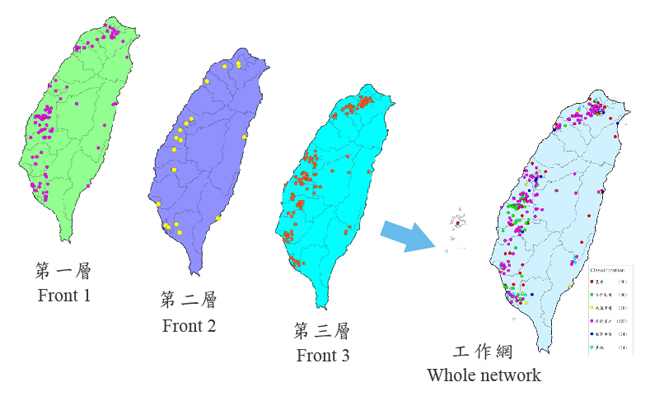Innovative techniques
 Network of RBPR on fresh produce
Network of RBPR on fresh produce
To ensure fresh produce is free from pesticide contamination, a network was established across Taiwan for the RBPR on fresh produce at production sites, wholesale markets and supermarkets. In 2012 for instance, 780,000 shipments of fresh produce (vegetables and fruits) were screened for pesticide contaminants at 359 inspection stations in the three tiers described below.
1st tier of RBPR:
Inspection of vegetables and fruits at farmer’s associations, where the freshly harvested produce is gathered and processed for marketing. In 2012, 267,000 shipments of fresh produce were inspected at 130 inspection stations.
2nd tier of RBPR:
Inspection of vegetables and fruits at wholesale markets and supermarket chains. In 2012, 243,000 shipments of fresh produce were inspected at 32 inspection stations.
3rd tier of RBPR:
Inspection of vegetables and fruits distributed to supermarkets, agri-businesses companies, the food industry, student lunch programs, military food supplies, group dining programs, private food companies, fast food chain stores and other retail outlets. In 2012, 274,000 shipments of fresh produce were inspected at 197 inspection stations.

 International cooperation on the RBPR program
International cooperation on the RBPR program
Through international cooperation, the technology of RBPR developed at TARI has been extended to neighboring countries including:
- Vietnam: The Sub-Institute of Agriculture Engineering and the Post-Harvest Technology Institute (PHTI) in Ho Chi Minh City have applied the enzyme screening kit developed at TARI to survey pesticide residues on fresh produce since 1997, receiving the National Food Safety Award for their efforts in 2003.
- Republic of Korea: Using the enzyme screening kit developed at TARI, the NACF of South Korea established more than two hundred stations for inspection of pesticide residues on fresh produce for consumers and military food supplies. This pesticide screening kit was also used in other organizations such as the KFDA.
- Central America: The Republic of Panama introduced RBPR program in 2004 and successfully implemented RBPR as an official protocol for screening fresh produce in a nation-wide program. The nation of Belize introduced the RBPR program in 2011 as a tool to monitor pesticide residues on fresh produce.

